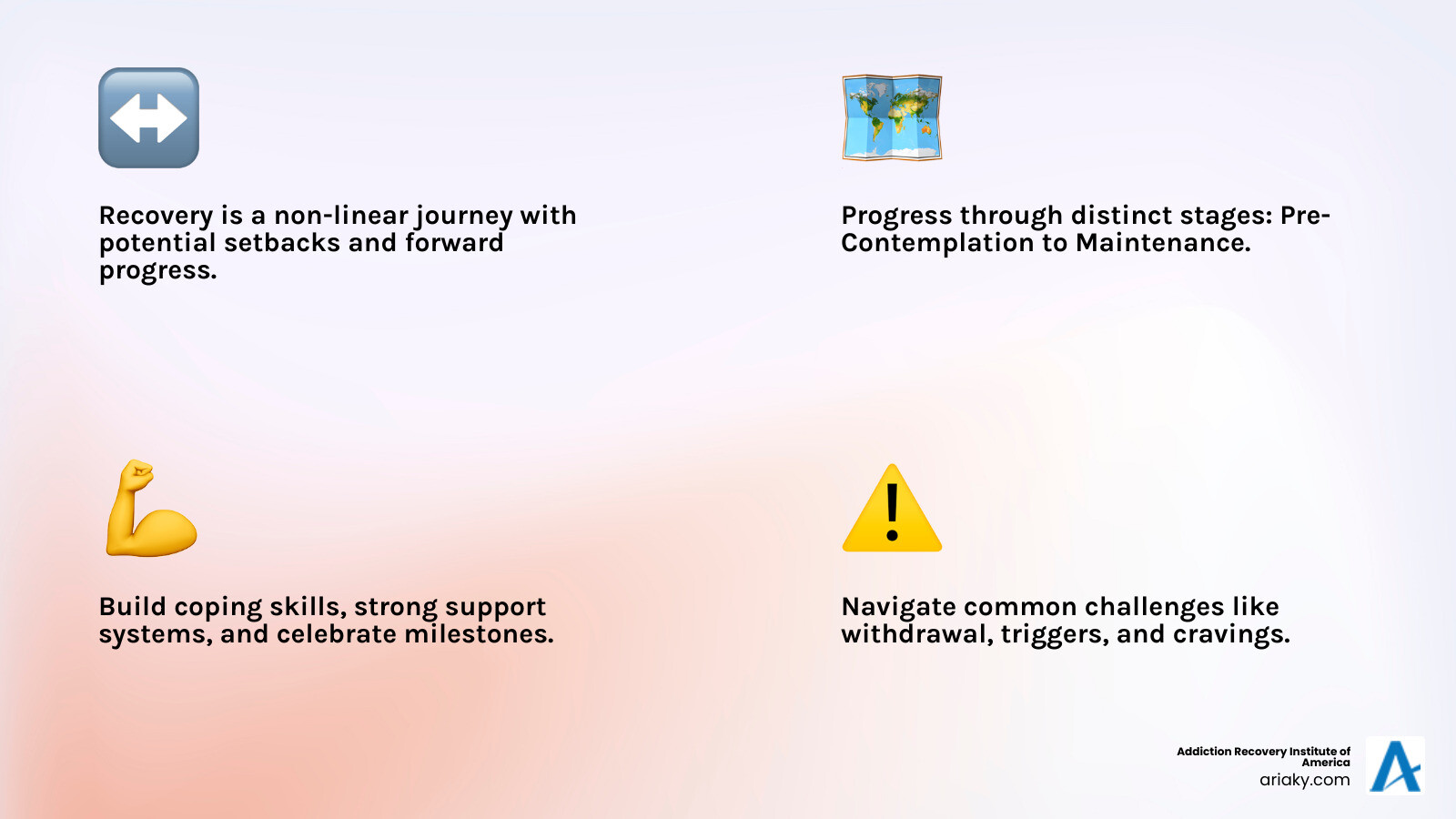Why Your Addiction Recovery Journey Matters
An addiction recovery journey is not a single event or destination—it’s an ongoing process of healing, growth, and reclaiming control of your life. This journey involves moving through different stages, facing challenges, building support systems, and learning to live without substances. While the path isn’t always linear and may include setbacks, recovery is absolutely possible with the right support and commitment.
What to Expect on Your Addiction Recovery Journey:
- Stages of Change – Moving from denial to contemplation, preparation, action, and maintenance
- Professional Treatment – Medical detox, residential care, and outpatient programs custom to your needs
- Support Systems – Family involvement, therapy, and community connections
- Relapse Management – Understanding that setbacks are common and learning how to steer them
- Long-Term Growth – Building a fulfilling life focused on health, home, purpose, and community
Recovery is a process of change through which you improve your health and wellness, live a self-directed life, and work toward reaching your full potential. According to research, approximately 74.8% of U.S. adults who reported ever having a substance use problem also reported being in recovery. This means recovery is not only possible—it’s happening for millions of people.
The journey begins with acknowledging the problem and taking that crucial first step toward help. Whether you’re just starting to recognize the need for change or you’re ready to commit to treatment, understanding what lies ahead can provide hope and direction.
Your recovery journey is uniquely yours. The time spent in each stage varies based on factors like the severity of addiction, co-occurring mental health conditions, your support system, and personal motivation. Some people move through stages quickly, while others take months or years. What matters most is that you keep moving forward, even when progress feels slow.

Understanding the Stages of the Addiction Recovery Journey
Your addiction recovery journey is rarely linear. Most people move forward, circle back, and take pauses along the way. The Transtheoretical Model of Change (developed by Prochaska, DiClemente, and Norcross) helps explain this process in five broad stages. How long you spend in each stage depends on many factors, including the severity of substance use, co-occurring mental health conditions, your support system, and your readiness for change.
Pre-Contemplation & Contemplation
In Pre-Contemplation, a person may not see their substance use as a problem. It’s common to feel defensive, minimize consequences, or focus on perceived benefits of use. Over time, consequences or concerns from loved ones can lead to Contemplation—acknowledging, “Maybe I do have a problem.” This phase is marked by ambivalence: weighing the pros and cons of change and feeling fear or uncertainty about what sobriety would mean. Nonjudgmental support helps people move forward when they’re ready.
Preparation & Action
Preparation turns recognition into planning. You might research treatment options, talk to others in recovery, set a quit date, or try brief periods of cutting back. Action is when concrete change begins—medical detox, residential care, or outpatient treatment—and you start practicing coping skills, navigating triggers, and learning new ways to manage stress and emotions.
Professional structure and support make a real difference during this phase. Explore options in our Drug Rehab Kentucky Guide and follow the Addiction Recovery Steps to build a strong foundation.
Maintenance & Long-Term Sobriety
Maintenance is about sustaining change and preventing relapse. This stage can last months, years, or a lifetime. It involves continued therapy and support, strengthening relationships, finding purpose, and developing routines that support health and stability. Over time, you build confidence and create a life that makes substance use unnecessary and undesirable. Learn how ongoing support fits into recovery through our Continuum of Care.
The Crucial Role of Professional Treatment
Addiction is a chronic, treatable disease—not a moral failing or lack of willpower. Effective care helps you manage the condition, regain control, and heal your brain and body. For research-backed guidance, see NIDA’s Principles of Drug Addiction Treatment: A Research-Based Guide.
Treatment works best when it’s individualized. Your history, substances used, co-occurring mental health conditions, and support system all shape what you need—and those needs can change over time.
Principles of Effective Addiction Treatment
- Address the whole person: medical, mental health, family, work, social, and legal needs
- Combine medication and therapy when appropriate (especially for opioid and alcohol use disorders)
- Stay in treatment long enough for lasting change; detox alone is not sufficient
- Reassess and adjust plans as needs evolve
- Use evidence-based behavioral therapies like CBT, DBT, and MI; see our Kentucky Addiction Treatment Therapy Programs
Levels of Care for Your Addiction Recovery Journey
Your recovery may involve different levels of care at different times. The continuum below supports you at every step:
| Level of Care | Description |
|---|---|
| Medical Detox | The safest way to begin recovery. Medical professionals monitor you 24/7 as your body clears substances and manages withdrawal symptoms. This supervised process keeps you safe and as comfortable as possible during the most physically challenging phase. Our Alcohol Detox Program KY provides this crucial first step with compassionate, expert care. |
| Residential Care | Also called inpatient treatment, this provides intensive support in a structured, substance-free environment. You’ll live at the facility while receiving therapy, learning coping skills, and building a foundation for long-term sobriety. It’s ideal when you need to step away from triggers and focus completely on healing. |
| Partial Hospitalization Program (PHP) | A step down from residential care, PHP offers structured treatment during the day while you return home in the evenings. You’ll receive several hours of therapy and support each day, making it perfect for those who need intensive care but have a stable home environment. Learn more about our PHP Treatment Kentucky options. |
| Intensive Outpatient Program (IOP) | IOP provides flexibility for those balancing treatment with work, school, or family responsibilities. You’ll attend therapy sessions several times per week while living at home and continuing your daily routine. Our Best Intensive Outpatient Program Kentucky helps you apply recovery skills in real-world situations. |
You can move between levels as your needs change, building skills and confidence over time.
Why Your Addiction Recovery Journey Matters
An addiction recovery journey is an ongoing process of healing and growth—not a single event. It includes stages of change, professional care, supportive relationships, relapse management, and long-term life-building. Setbacks can happen, and progress is often non-linear, but recovery is possible and common.
- Stages of Change: pre-contemplation, contemplation, preparation, action, maintenance
- Professional Treatment: detox, residential, PHP, and IOP customized to your needs
- Support Systems: family involvement, therapy, community
- Relapse Management: learning from setbacks and preventing future ones
- Long-Term Growth: cultivating health, home, purpose, and community
Your path is unique. Keep moving forward—at your pace.
Understanding the Stages of the Addiction Recovery Journey
Starting an addiction recovery journey is personal and non-linear. The Transtheoretical Model of Change (Prochaska, DiClemente, and Norcross) outlines common stages people pass through when making big life changes. You can learn more about this model here.
Pre-Contemplation & Contemplation
Pre-Contemplation often includes denial or defensiveness. In Contemplation, recognition grows alongside fear and ambivalence. It’s normal to wonder what sobriety will mean for your relationships, routines, and identity.
Preparation & Action
Preparation turns intention into steps—researching care, setting goals, and testing strategies. Action is where you engage in treatment, build coping skills, and practice new behaviors. Structured support is especially useful here: see our Drug Rehab Kentucky Guide and our Addiction Recovery Steps | The Drug & Alcohol Recovery Process.
Maintenance & Long-Term Sobriety
Maintenance focuses on sustaining change, growing support, and preventing relapse over the long term. It’s about creating a life where substance use no longer fits. Explore ongoing support in our Continuum of Care.
The Crucial Role of Professional Treatment
Addiction is a chronic, treatable disease. With the right care, you can manage it and rebuild your life. For the evidence base, see NIDA’s Principles of Drug Addiction Treatment: A Research-Based Guide.
Effective treatment is individualized and holistic. It often blends medication (when indicated) with therapy, emphasizes adequate duration, and adapts as your needs change. Behavioral therapies such as CBT, DBT, and MI are core components; see our Kentucky Addiction Treatment Therapy Programs.
Levels of care may include:
- Medical Detox: supervised, safe withdrawal support; our Alcohol Detox Program KY can help
- Residential Care: a structured, substance-free setting for intensive healing
- PHP: daytime treatment with evenings at home; see PHP Treatment Kentucky
- IOP: flexible therapy several days a week while maintaining daily responsibilities; see Best Intensive Outpatient Program Kentucky
The right mix of services—and enough time in care—greatly improves long-term outcomes.
Why Your Addiction Recovery Journey Matters
Recovery is a process of change that helps you improve health and wellness, live more self-directed, and reach your potential. Millions of Americans report being in recovery, which means change is not just possible—it’s happening.
Expect a non-linear path with stages of change, professional support, and ongoing growth. Your timeline is unique; persistence and support make the difference.
Understanding the Stages of the Addiction Recovery Journey
Recovery is a personal, often winding path. The Transtheoretical Model of Change helps explain why people move forward, pause, or revisit earlier steps as they grow.
Pre-Contemplation & Contemplation
Pre-Contemplation may include denial or feeling in control. Contemplation brings ambivalence—recognizing concerns while fearing change. Compassionate conversations help reduce defensiveness.
Preparation & Action
Preparation includes researching care, setting goals, and taking small steps. Action means engaging in treatment, building coping skills, and practicing new behaviors. Structured support is crucial: see our Drug Rehab Kentucky Guide and Addiction Recovery Steps | The Drug & Alcohol Recovery Process.
Maintenance & Long-Term Sobriety
Maintenance focuses on sustaining change, strengthening support, and preventing relapse while building a fulfilling life. Learn how ongoing care supports stability in our Continuum of Care.
The Crucial Role of Professional Treatment
On an addiction recovery journey, professional treatment is often foundational. Addiction is a chronic, treatable disease that requires ongoing management. For a research overview, see NIDA’s Principles of Drug Addiction Treatment: A Research-Based Guide.
Effective care is individualized and holistic—addressing medical needs, mental health, relationships, work, and legal concerns. Behavioral therapies like CBT, DBT, and MI help you build practical coping skills; explore options in our Kentucky Addiction Treatment Therapy Programs.
Treatment needs can change, so plans should be reassessed and adjusted over time. Detox may be the first step, followed by residential or outpatient care, with aftercare and community support sustaining long-term progress.


